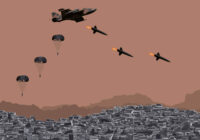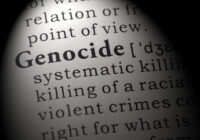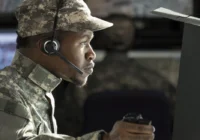On January 26, 2024, the International Court of Justice (ICJ) issued a preliminary ruling in the case of South Africa v. Israel. The ICJ’s rejected Israel’s attempt to discount South Africa’s claims. Despite this, the contradictory judgment ended up supporting the Israeli administration. Furthermore, the ICJ failed to proclaim a truce to save lives.
The well-documented crimes against the Palestinian people since October 7, 2023 are indescribable. Approximately 28,000 people have been killed so far, with at least 10,000 of them being children. To put it another way, that’s one Palestinian child dead every 15 minutes. Under the debris, many more people remain missing; the majority are thought to have perished.
According to the ICJ judgment, the Israeli military, not Israeli Prime Minister Benjamin Netanyahu’s administration, should be held accountable for crimes under Article II of the Genocide Convention. This implies that Netanyahu’s hands are clean. Yet substantial proof shows that his cabinet meticulously planned the Palestinian holocaust long before October 7. The Israeli military is organized into a command organization; Israeli troops and pilots carried out the illegal orders given by the Netanyahu administration.
The commission of genocidal crimes
South Africa argued that the Israel’s crimes “are genocidal in character because they are intended to bring about the destruction of a substantial part of the Palestinian national, racial and ethnic group,” citing Article II of the Genocide Convention. The alleged crimes include the murder of Palestinians in Gaza, severe physical and psychological abuse and living circumstances designed to endanger their physical survival.
The nature and conduct of Israel’s military operation in Gaza also suggest this intent. Israel’s failure to guarantee or supply the besieged and blockaded Palestinian people with food, water, medicine, fuel, shelter or other humanitarian aid drove them to the verge of starvation. All of the activities may be attributed to Israel, which is committing genocide in clear violation of the 1948 UN Convention on Prevention and Punishment of the Crime of Genocide and has failed to stop it from happening.
Individuals who perpetrate acts of genocide or any other crimes listed in Article III will face consequences, regardless of their status as legally appointed authorities, public servants or private citizens. The Constitutionally Responsible Rulers (CRRs), or civilian politicians, are the principal perpetrators of the genocide against Palestine. In the ruling, which refers to Article IV, the ICJ urges the Netanyahu administration to act on behalf of the State of Israel and to stop and punish those who are accused of committing crimes of genocide: “The State of Israel shall take all measures within its power to prevent and punish the direct and public incitement to commit genocide in relation to members of the Palestinian group in the Gaza Strip.”
South Africa urges the ICJ to take action on Israel’s proposed Rafah attack. On February 12, 2024 — the day that South Africa made their request — Israeli soldiers struck 14 homes and three mosques in the heavily populated city of Rafah. Several people were killed and hundreds of displaced families were forced to evacuate. The next day, on February 13, South Africa requested the ICJ examine if more emergency measures are necessary to safeguard Palestinians. This came in light of Israel’s intention to expand its attack in the Gaza Strip towards Rafah.
Over one million Palestinians have sought Rafah as a sanctuary from the onslaught that has transpired since Hamas rebels assaulted Israel on October 7. The Genocide Convention and the ICJ’s January 26 order would be gravely and irrevocably broken by an Israeli assault on the city. The central question in South Africa’s case — whether or not there has been genocide in Gaza — has not yet been decided by the court. However, it acknowledged that Gaza’s Palestinian population had a right to be shielded from acts of genocide. South Africa is requesting that the court impose more sanctions on Israel, claiming that the country has already disregarded the ruling that was issued a few weeks ago. In the end, South Africa is requesting a proclamation that would save Palestinian lives.
The criminality of the international legal system
The ICJ ruling suggests that Netanyahu’s cabinet and other CRRs listed in Article IV are innocent. Netanyahu, Yoav Gallant, Itamar Ben-Gvir, Israel Katz, Bezalel Smotrich and other CRRs are the architects of the genocide. Yet the ICJ has given them the task to prevent and punish. The ICJ has appointed the CRRs in Netanyahu’s cabinet to take all measures within their power to prevent and punish public officials, private individuals and military personnel who are engaging in direct and public incitement to commit genocide. (These same rulers are working on behalf of the State of Israel and meticulously planned a genocide against Palestinians before October 7.) It is not thought that Israel’s Netanyahu coterie of CRRs “who have blood on their hands” will be subject to prevention or punishment.
Although the ICJ had many verbal criticisms of Israel, the peace movement ignores that the court did not create any legal barriers or obstacles to stop the ongoing crimes against Palestinians. One such crime is Israel’s plan to generate starvation in the Gaza Strip. There has never been widespread famine as it is happening in Gaza right now. Although food security was unstable before the conflict that started on October 7, less than 1% of children experienced severe acute malnutrition. Nearly every Gazan regardless of age is in danger right now, wherever they are in the region.
Additionally, the criminality of the international legal system is at issue. Israel now has the de facto green light from the ICJ to carry out the genocide, and the country began escalating its slaughter one week after the ruling. There are currently more Israel Defence Forces (IDF) personnel being deployed in the occupied West Bank, and crimes are being perpetrated there as well. IDF commanders in Gaza have ordered soldiers to set fire to non-combatants’ homes for the sole purpose of collective punishment. Plans to create a coherent network of Jewish colonies in Gaza were proposed within a few days following the ICJ ruling.
In response to Netanyahu, US President Joe Biden’s administration has decided to freeze financing for the UN Relief and Works Agency (UNRWA). The UNRWA provides food, shelter, healthcare, education and other necessities. As a result, this move is expected to lead to a collapse in social services, rising death, destruction, displacement and famine for the 5.9 million Palestinian refugees registered with UNRWA in East Jerusalem, the West Bank, Gaza, Jordan, Lebanon and Syria.
The Netanyahu-led Israeli Government has been accused of plausibly genocidal acts against Palestine by the Republic of South Africa, and the ICJ’s provisional measures order has given it a mandate to take all measures within its power to prevent and punish those who have committed genocidal acts. Does this seem incongruous? From a perverse legal perspective, the ICJ ruling suggests that Netanyahu’s cabinet, which was “appointed” to carry out the “prevent and punish” mission, cannot be held accountable for any “genocidal acts.” Essentially, this conflicting mandate — which was meant to save the Gaza population — gives the administration a reason to “prevent and punish” Palestinians for allegedly carrying out crimes of genocide against Israelis.
The Likud coalition administration, which was primarily in charge of organizing a comprehensive genocide strategy with the US’s collaboration before October 7, is not challenged politically in the ICJ judgment. It was anticipated that this vote would help spark a fresh round of illegal actions by the Netanyahu administration. Netanyahu had previously said that the slaughter was still happening on January 26: “We will not compromise on anything less than total victory … We are continuing until we eliminate Hamas…”
Pertinent questions in a grim future
The bogus celebration of a phony victory at The Hague has temporarily calmed the world’s fury. Israel’s genocide will persist as long as the US and its top justice at the ICJ continue to use fresh, deceptive rhetoric and postpone measures to keep the rest of the world away.
The ICJ concedes that the State of Israel may have committed war crimes. Still, it vehemently rejects South Africa’s interim proposals, such as a ceasefire, which would have served to temporarily halt the continuous atrocities against the Palestinian people. Does the ICJ not consider this a criminal act that would undoubtedly cause many Palestinian civilian deaths? This means that while there are hollow and vacuous accusations made against the State of Israel, Netanyahu’s genocide remains essentially unaffected.
War crimes and conflicts have always been started by civilian politicians throughout history. The government that is determined to carry out genocide against the people of Palestine is the source of the illegal orders that the Israeli military has been obeying. And now that the ICJ ruling has been made, Israel’s CRRs can assign responsibility to the Israeli army.
Ironically, the Netanyahu coterie will be able to tighten its grip on the Israeli protest movement and single out Israelis who have firmly opposed the massacre thanks to the ICJ’s prevent and punish mandate. The judgment made on January 26 is temporary, and it may take years before the entirety of South Africa’s case is taken into consideration. That includes a definitive determination of whether or not Israel is engaging in genocide.
The only realistic way to put an end to this humanitarian crisis is through an immediate ceasefire. That should also clear the path for diplomatic negotiations to recognize and establish the state of Palestine. Considering Israel’s unwavering resolve and its influential supporters, this scenario sounds unlikely. But again, some weeks feel like decades. Even if the past 16 weeks have brought about unspeakable pain, loss and damage, they have also witnessed a significant change in support for the Palestinian cause.
Over 25% of Palestine’s population is in danger of starving as a result of a humanitarian crisis that has forced over 80% of the people into displacement. The ICJ’s verdict indicates this change in momentum. South Africa’s act of moral commitment, the isolation of Israel and its supporters — including the US and the UK — in international fora and the ongoing peace protests taking place across the world are hopeful signs for the future.
South Africa’s latest request for emergency measures must be granted at once. It is about time Israel’s supporters heeded the call of the times and instilled some common sense in Israel, both for the country’s sake and the benefit of all humanity.
[Lee Thompson-Kolar edited this piece.]
Support Fair Observer
We rely on your support for our independence, diversity and quality.
For more than 10 years, Fair Observer has been free, fair and independent. No billionaire owns us, no advertisers control us. We are a reader-supported nonprofit. Unlike many other publications, we keep our content free for readers regardless of where they live or whether they can afford to pay. We have no paywalls and no ads.
In the post-truth era of fake news, echo chambers and filter bubbles, we publish a plurality of perspectives from around the world. Anyone can publish with us, but everyone goes through a rigorous editorial process. So, you get fact-checked, well-reasoned content instead of noise.
We publish 2,500+ voices from 90+ countries. We also conduct education and training programs
on subjects ranging from digital media and journalism to writing and critical thinking. This
doesn’t come cheap. Servers, editors, trainers and web developers cost
money.
Please consider supporting us on a regular basis as a recurring donor or a
sustaining member.
Will you support FO’s journalism?
We rely on your support for our independence, diversity and quality.











Comment